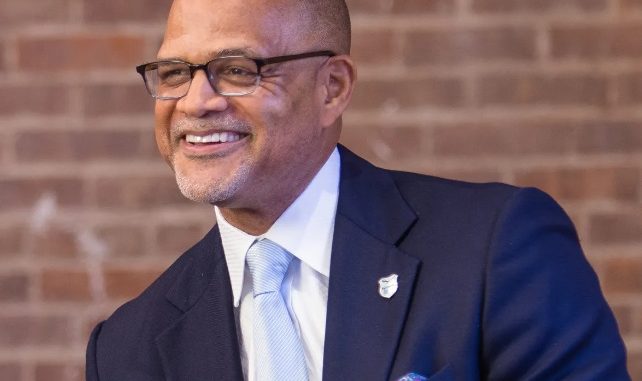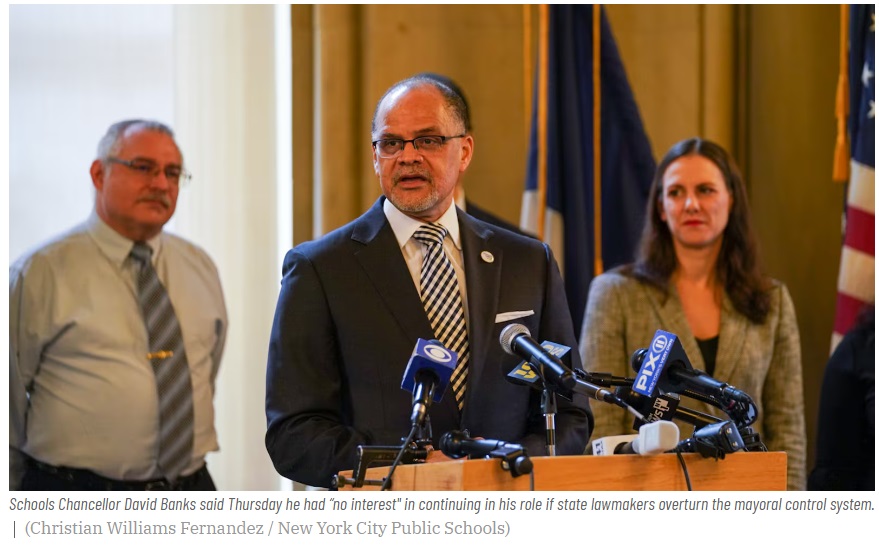
From Editor Betsy Combier:
Great news, Mr. Banks! We await your resignation with great relief.
I have four children, all of whom were in public schools in New York City. In 1997, I started investigating how the DOE worked because there seemed to be a lack of transparency and very little effort by administrators to get needed programs and resources for the children who attended DOE schools. Mayoral control was supposed to change that. It didn’t.
Instead, I witnessed the procurement of programs and resources that offered nothing in terms of spurring achievement but gave DOE administrators political and financial benefits. This is just unacceptable.
Chicago, another city with mayoral control over its public school system, is ending this policy.
New York City must do the same.
In 2007 I wrote an article on the disaster of Mayoral control.
No one responded to the attack on Black and Hispanic parents in Mike Bloomberg’s Mayoral control plan that threw out the rights of parents to vote for the people who would represent them:
Michael Cardozo’s introduction to his submission which removes the constitutional rights of NYC citizens
Pages index -11
Pages 12-25
Pages 26-41
Pages 42-58
Pages 59-80
We need to get back to an elected school board where parents, employees and all stakeholders can be heard.
Here’s my message to Chancellor Banks:
“Thank you, Mr. Banks, for leaving. Mayoral control must end. We, the parents, have had no voice since 2003, when Mayoral control took that away. Instead, we have all been given a panoply of platitudes as compensation. The way to proceed is to elect a school board and put strategies for accountability into place to keep the elected members focused on the needs, safety, and health of the children, not of an appointed few or a single appointed individual. Please shut the door when you leave.”
Just sayin’…
Betsy Combier
Facebook
Twitter
Editor, ADVOCATZ.com
Editor, ADVOCATZ blog
Editor, Parentadvocates.org
Editor, New York Court Corruption
Editor, NYC Rubber Room Reporter
Editor, NYC Public Voice
Editor, National Public Voice
Editor, Inside 3020-a Teacher Trials
NYC chancellor said he’d resign without mayoral control. His threat could add fuel to critics.
Julian Shen-Berro, Chalkbeat, March 15, 2024
New York City schools Chancellor David Banks made headlines this week saying he had “no interest” in continuing in his role if state lawmakers enact sweeping changes to the city’s school governance structure.
That statement, some observers say, is likely to harm his cause.
For months, Banks has served as an ardent defender of the polarizing mayoral control system, which centralizes power over the city’s schools in the hands of Mayor Eric Adams and is set to expire on June 30.
The comments represent an escalation of the chancellor’s rhetoric on mayoral control. They come just weeks before the expected March 31 release of a state Education Department report on the city’s current school governance structure that Albany lawmakers say will help inform if and how they extend mayoral control.
Earlier this week, state legislators chose not to include an extension of mayoral control in their budget proposals — an initial rejection of the four-year extension sought by Gov. Kathy Hochul. Lawmakers have argued the city’s school governance structure should be determined outside of budget negotiations.
The school governance structure has been regularly extended over the past two decades and has largely relied on the mayor’s power to choose a schools chancellor and appoint a majority of members to the Panel for Educational Policy, or PEP, a city board that votes on major policy proposals and contracts.
In prior years, lawmakers have tweaked mayoral control to weaken the mayor’s grip on the PEP. In 2022, for example, they adjusted the system so that PEP members could no longer be removed for voting against their appointer’s wishes, making it harder to remove a panelist for opposing proposals from City Hall. At the same time, the board also expanded from 15 to 23 members, with the mayor appointing 13 of them and retaining the majority.
But recent months have seen repeated calls from critics of the school governance structure to go a step further and remove the mayor’s ability to appoint a majority of members.
On Thursday, Banks told reporters that such a change would render his position ineffective.
“If you don’t have the majority of the vote, you don’t have the power, because that means now you have to negotiate for every vote that you’re trying to do,” he said. “That’s politics. I do not think that that would be good for the school system. I certainly did not sign up for that.”
Banks added he had “no interest in serving as a chancellor in a system where you don’t really have the authority to make real decisions.”
Observers expressed surprise at the chancellor’s comments, noting they could very well fuel critics who argue the system excludes community voices.
“His reasoning shot himself and the mayor in the foot, regarding the assumption of autocratic rule,” said David Bloomfield, a professor of education, law, and public policy at Brooklyn College and the CUNY Graduate Center. “He gave opponents of mayoral control good reason for calling out the lack of openness to other points of view.”
Banks opens himself to criticism from opponents
Banks voiced “the quiet part out loud,” said Jonathan Collins, a professor of politics and education at Columbia University’s Teachers College.
“What usually attracts superintendents or chancellors into these roles under mayoral control is, of course, the autonomy — the ability to make sweeping reforms without a lot of political barriers,” he said. “But you still see these administrative figures give lip service to the idea of connecting with communities and making reforms that are rooted in understanding the needs of kids across a district.”
In his two years at the helm of the nation’s largest school system, Banks has staked his legacy on overhauling the city’s approach to literacy, requiring all elementary schools use one of three curriculums. His curriculum mandates have also reached prekindergarten and ninth grade algebra and will likely continue to expand.
To Bloomfield, the Thursday comments suggested that Banks “believes the knee jerk reaction of non-mayoral appointees would be in opposition” to proposals from the chancellor.
“The idea that he doesn’t think he could convince a majority of the PEP — no matter how constituted — to buy into his leadership is shocking,” he said.
Some members of the PEP also felt blindsided by the chancellor’s comments.
Kaliris Salas-Ramirez, a PEP member appointed by Manhattan Borough President Mark Levine, said she’s had productive conversations with Banks, though they don’t always agree. Salas-Ramirez added he should know that she and the other non-mayoral appointees are working with the city’s Education Department to improve its schools.
“What do I believe? Do I believe in the man that sits down and talks to me, or do I believe this person that’s showing up at press conferences and saying the opposite?” she said. “I’m still a little perplexed, and wondering how he believes that after hearing comments like that we can continue to genuinely engage with each other as the state is having these conversations around mayoral control.”
Banks’ comments suggest fears over mayoral control’s future
To Collins, the comments signal the chancellor feels “a high degree of uncertainty” over the fate of mayoral control.
And though Bloomfield does not expect the comments from Banks to significantly influence the decision by lawmakers, he noted they still hurt the case for renewal.
“It’s apparent from his extreme rhetoric that he sees mayoral control in danger,” he said. “But he did the effort for extension a disservice by holding his own chancellorship hostage.”
Meanwhile, Adams doubled down on the chancellor’s opposition to reforming mayoral control during an interview on PIX11 on Friday.
“I am not going to have a pseudo-mayoral control. I want to be held accountable for improving our educational system,” he said. “That’s what the chancellor wants. … Let us continue the good work that we are doing. Don’t let politics get in the way of our pupils.”
Julian Shen-Berro is a reporter covering New York City. Contact him at jshen-berro@chalkbeat.org.





Be the first to comment